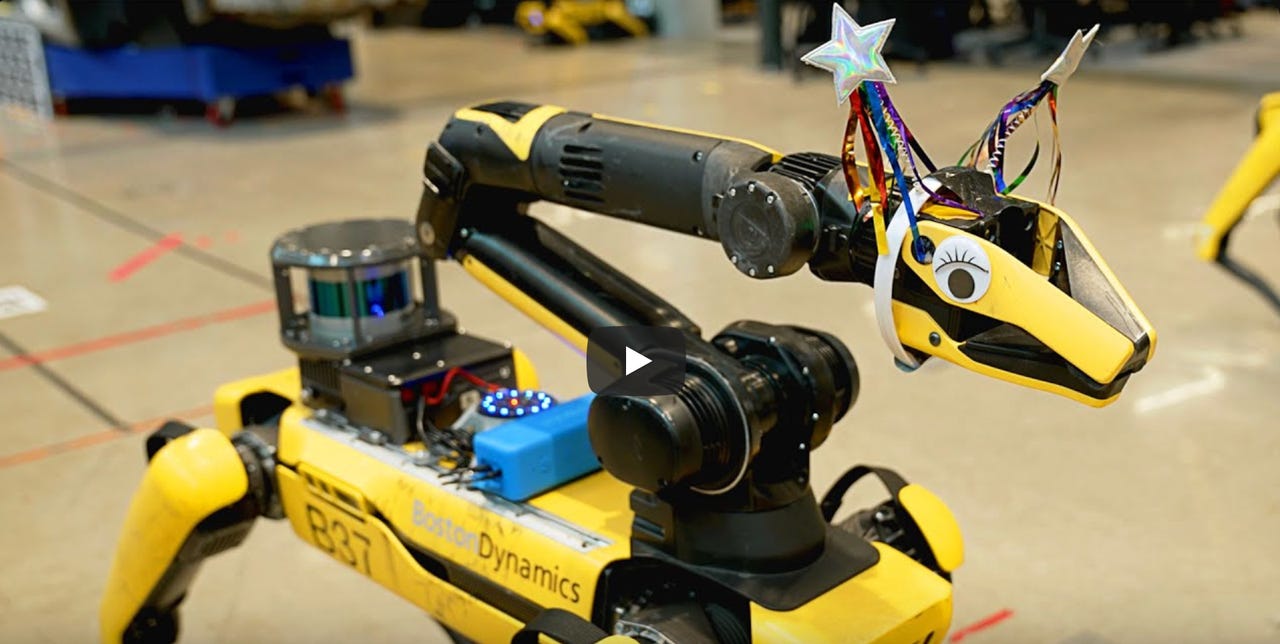
Jeeves, please fetch me a glass of port. Screenshot by Chris Matyszczyk/ZDNET
When you think of ChatGPT, what comes to mind?
The latest tech fad? A get-rich-quick moneymaker for some and a lose-your-job-quick worrymaker for others?
Perhaps you’ve even experienced a tinge of mere general creepiness.
Also: The best AI chatbots: ChatGPT and other noteworthy alternatives
For me, there are three distinct groups of humans reacting to generative AI — the Fearful, the Experimenters, and the Capitulists. (Those last ones are capitalists who have just capitulated and decided generative AI will soon rule the world.)
Today, I’d like to focus on some experimenters who may not entirely realize the good they’re suddenly perpetrating.
Over the years, you’ve possibly seen many demonstrations of robot dogs performing various stunts. Leaping up and throwing things, running at fast speeds, or even — please be prepared — pole dancing.
I’ve long been rather fascinated by robot dogs, and not necessarily in an affectionate way.
As they clunk along, like little dressage horses with arthritis, I find myself wondering whether they could really have a purpose, never mind that their general being is somewhat high on the creepy factor.
Why, when the US Marines experimented with robot dogs in battle, they discovered that, oh dear, the robot dogs’ clunking made too much noise and gave away the troops’ position.
Also: The best robot vacuums: Expert tested and reviewed
But how could ChatGPT help a robot dog find its place in the world?
By teaching it to whisper? Not at all. By giving it an informed brain, perhaps? Well, in a way.
The clever humans at Boston Dynamics recently injected a little ChatGPT into Spot the robot dog. And the results (mostly) were riveting.
Good sir, said the good dog
“Greetings, good sirs, may I have the pleasure of knowing your names?” This question was uttered by the ChatGPT-powered Spot. In a voice entirely reminiscent of snooty butlers you’ve seen in many movies — Batman, for example, or Arthur.
Alright, it’s still a touch creepy that the robot dog’s “mouth” is actually a gripper that moves up and down in a faintly medieval way. But when your clunker of a dog suddenly offers genteel, servile tones it’s hard to avoid being marginally soothed.
In this case, Spot had been ChatGPT’d to guide the innocent bystander around the Boston Dynamics lair. It can even answer questions with true corporate sincerity.
Also: The 15 best robots and AI tech we saw at CES 2024
For example, Matt Klingensmith, principal software engineer for robot autonomy (hmm…) at Boston Dynamics, asks Spot: “How do you like your job?”
That’s a difficult question for any human confronted by their boss, but when you’re confronted by the very being who made you — what do you say?
ChatGPTSpot offered: “Ah, Mr Matt. My employment as a tour guide provides great satisfaction. I find the dissemination of knowledge rather rewarding, don’t you agree?”
He’s an awful suck-up. He’ll go far.
Shakespearean Time Traveler, anyone?
Of course, ChatGPT helps Spot become whatever you — or, currently, its engineers — want it to be. Personality-wise, that is.
You may find it less — or perhaps more — edifying when it becomes Precious Metal Cowgirl or Excited Tour Guide. Perhaps you’ll be charmed by 1920’s archaeologists or inspired by Teenage Robot. The Shakespearean Time Traveler is its own kind of hoot, too.
Klingensmith and his colleagues brought together other new technologies to accompany ChatGPT in this decreepization experiment.
Also: This is what AI will produce during the next decade and beyond
“Some exciting new image captioning and visual question-answering models came out and new voice recognition software and voice creation software,” he said. Why not bring them together to see what results?
The utterly lovable Josh
I confess to a personal favorite. No, I don’t want to order a butler around my house, so that he speaks to me in venerating tones.
For reasons I can’t begin to fathom, the robot dog GPT-powered personality I most warmed to was called Josh. He seemed to understand how the world works yet oddly, Klingensmith described Josh as the “sarcastic” personality.
“Hey, Spot, what else do you see?” asked Klingensmith of Josh.
Also: AI will unleash the next level of human potential. Here’s how it happens – and when
“Well, Matt. I see the unfathomable void of my existence reflected in this QR-code-filled board. Oh, and also a large window,” came the reply.
Asked to create — on the spot, as it were — a haiku about the Boston Dynamics home, Josh offered: “Generator hums low, In a room devoid of joy, Much like my soul, Matt.”
Now that’s the sort of disarming, worldly-wise robot dog I wouldn’t mind wandering around my house.
I think.







